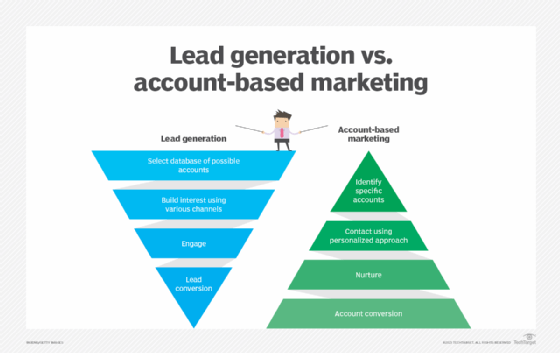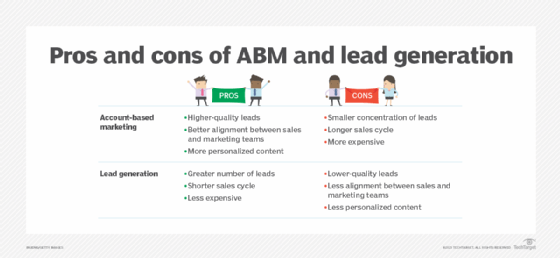Account-based marketing vs. lead generation, explained
Discover the key differences between lead generation and account-based marketing, as well as pros and cons and how to decide which approach is best for your organization.
Account-based marketing is an ideal complement to lead-generation efforts that focus on long-term revenue growth. But how do the two approaches differ, and what are the benefits of each one? This article describes both approaches and will help you choose which strategy is the best one to drive your marketing strategy.
What is ABM?
Account-based marketing (ABM) is a B2B strategy that focuses sales and marketing efforts on key accounts within a specific market.
ABM treats key accounts using personalized one-to-one experiences and tailors content about a company's product offerings to meet an account's needs and pain points. The strategy strives to improve pipeline quality, retention efforts and revenue across key accounts. An ABM approach strengthens the customer relationship through personalized support while complementing traditional lead-generation efforts.
What is lead generation?
The process of attracting potential customers to a business or service and guiding them into the sales pipeline is known as lead generation. It involves converting people into prospects using various channels, such as search, social media, email and company websites. Lead generation aims to raise peoples' interest in products and services and eventually convert them into customers.
Key differences between ABM and lead generation
ABM and lead generation differ in the following key areas:
- Intended audience. ABM uses one-on-one customer outreach in a specific market, while lead generation is intent on generating qualified leads and signing up new customers.
- Degree of personalization. ABM is highly personalized, while lead generation is less personalized.
- Alignment of sales and marketing. ABM requires close alignment between sales and marketing teams, while lead generation focuses more on marketing.
- Metrics used. ABM is measured by the number of accounts targeted and the revenue generated, while lead generation is measured by the number of leads generated and the conversion rate.

Pros and cons of ABM and lead generation
Here are some pros and cons of account-based marketing and lead generation:
The pros of ABM are as follows:
- As a more targeted approach, it tends to generate higher-qualified leads.
- It requires close alignment between sales and marketing teams, which can help improve communication and collaboration.
- Customized content and resources can help improve engagement and conversion rates.
The cons of ABM are as follows:
- It focuses on a smaller number of accounts.
- It has a longer sales cycle, due to targeted messaging and content. This means it might take longer to convert accounts into long-term customers.
- It can be more costly than lead generation because it requires more personalized content and resources.
The pros of lead generation are as follows:
- It focuses on generating qualified leads and signing up new customers.
- It generates leads quickly, which can help shorten the sales cycle.
- It is less costly than ABM because it requires less personalized content and resources.
The cons of lead generation are as follows:
- It tends to generate lower-quality leads.
- There is less alignment between sales and marketing teams, which can result in miscommunication and a lack of collaboration.
- It requires less personalized content and resources, which can lead to lower engagement and conversion rates.

Which strategy is right for your business?
To decide which strategic approach is best for your company, consider the following factors:
- Who is your target audience? ABM works best for companies with a small number of high-value accounts, while lead generation is better for companies with a large number of smaller-value potential customers.
- What does your sales cycle look like? If your product or service requires a longer sales cycle due to compliance or security issues, ABM is a better fit. Companies with shorter sales cycles will likely lean toward lead generation.
- What is your budget? ABM can be more expensive than lead generation because of its more personalized resources. A company with an expensive product or service can more easily justify the costs of a personalized sales, marketing and customer support approach.
Ultimately, the selection of ABM or lead generation depends on your business goals, target audience, sales cycle and budget.
Editor's note: TechTarget offers ABM and project intelligence data, tools and services.







